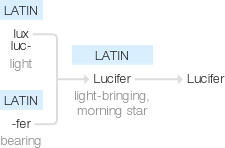Lucifer
Old English, from Latin, ‘light-bringing, morning star’, from lux, luc- ‘light’ + -fer ‘bearing’. Lucifer (sense 1) is by association with the ‘son of the morning’ (Isa. 14:12), believed by Christian interpreters to be a reference to Satan.
wiktionary
Originally a brand name for matches made by Samuel Jones from 1830, soon used generically for self-igniting matches of any brand. From lucifer(“bringer of light”)
etymonline
Lucifer
Old English Lucifer "Satan," also "morning star, Venus in the morning sky before sunrise," also an epithet or name of Diana, from Latin Lucifer "morning star," noun use of adjective, literally "light-bringing," from lux (genitive lucis) "light" (from PIE root *leuk- "light, brightness") + ferre "to carry, bear," from PIE root *bher- (1) "to carry," also "to bear children." Venus in the evening sky was Hesperus.
Belief that it was the proper name of Satan began with its use in Bible to translate Greek Phosphoros, which translates Hebrew Helel ben Shahar in Isaiah xiv.12 — "How art thou fallen from heaven, O Lucifer, son of the morning!" [KJV] Because of the mention of a fall from Heaven, the verse was interpreted spiritually by Christians as a reference to Satan, even though it is literally a reference to the King of Babylon (see Isaiah xiv.4). Sometimes rendered daystar in later translations.
As "friction match," 1831, short for Lucifer match (1831). Among the 16c. adjectival forms were Luciferian, Luciferine, Luciferous. There was a noted Bishop Lucifer of Cagliari in Sardinia in the 4th century, a strict anti-Arian regarded locally as a saint.
